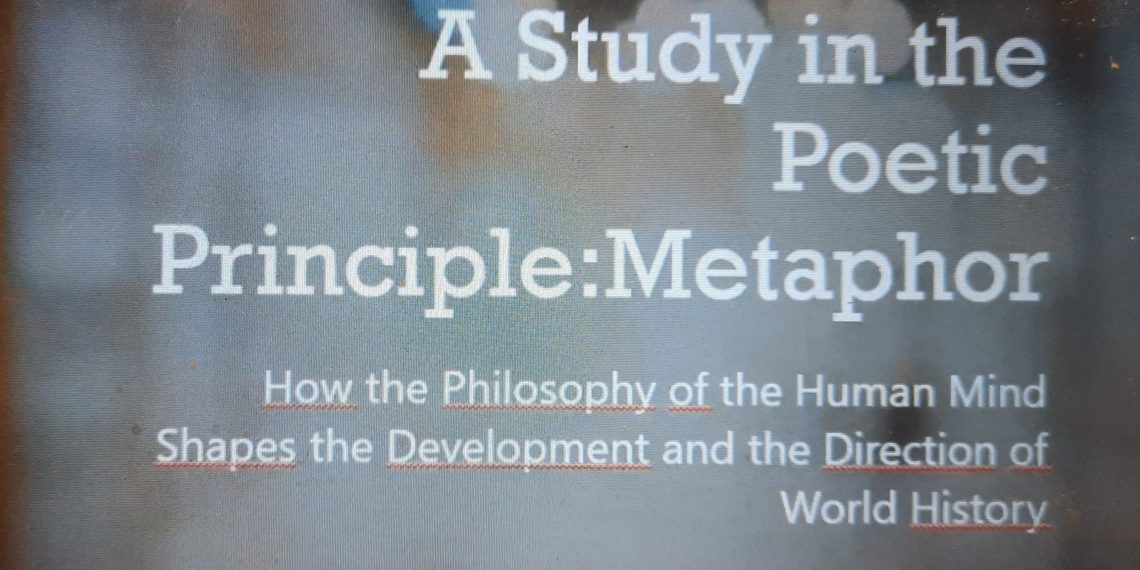I detta föredrag om metaforen som poetisk princip tar Stephen Brawer upp poesins betydelse för att forma världshistoria.
I föredraget utgår han från Percy Shelleys litteraturfilosofiska kampskrift “Till poesins försvar”, från kyrkofadern Augustinus´ text “Om Musik”, från John Keats´dikt “Ode” och från Lyndon LaRouches artikel “Om metaforer”.
Stephen Brawer avslutar med att säga: “Förmågan att förstå poesins uppbyggnad som ett KLASSISKT verktyg för att höja ett folks tankeförmåga så att det kan klara av historiens utmaningar, det är något som inte existerar i poesin av idag.”
Se föredraget som är på engelska HÄR: https://youtu.be/7iu74nhGuBU
Att läsa: “On the Subject of Metaphor” by Lyndon H. LaRouche, Jr. Reprinted from FIDELIO Magazine, Vol . 1 No.3 , Fall 1992 https://archive.schillerinstitute.com…
Ode
By John Keats 1795-1821
(Dikten finns tyvärr ännu inte översatt till svenska.)
Bards of Passion and of Mirth,
Ye have left your souls on earth!
Have ye souls in heaven too,
Double-lived in regions new?
Yes, and those of heaven commune
With the spheres of sun and moon;
With the noise of fountains wond’rous,
And the parle of voices thund’rous;
With the whisper of heaven’s trees
And one another, in soft ease
Seated on Elysian lawns
Brows’d by none but Dian’s fawns
Underneath large blue-bells tented,
Where the daisies are rose-scented,
And the rose herself has got
Perfume which on earth is not;
Where the nightingale doth sing
Not a senseless, tranced thing,
But divine melodious truth;
Philosophic numbers smooth;
Tales and golden histories
Of heaven and its mysteries.
Thus ye live on high, and then
On the earth ye live again;
And the souls ye left behind you
Teach us, here, the way to find you,
Where your other souls are joying,
Never slumber’d, never cloying.
Here, your earth-born souls still speak
To mortals, of their little week;
Of their sorrows and delights;
Of their passions and their spites;
Of their glory and their shame;
What doth strengthen and what maim.
Thus ye teach us, every day,
Wisdom, though fled far away.
Bards of Passion and of Mirth,
Ye have left your souls on earth!
Ye have souls in heaven too,
Double-lived in regions new!
ODE TILL EN GREKISK URNA
Efter John Keats av Anders Österlilng
Du fridens ännu oförkränkta brud,
lång tystnads fosterbarn! Så blomster-väfd
vår rytm ej glider som det vårskogs-bud
din mun oss bär från stilla tid och häfd:
Hvad lofvad saga från arkadisk bygd
med dödliga och gudar om hvarann
står skrifven öfver din förnäma form?
Hvad vild förföljelse i trädens skygd,
man efter mö, som ej han gripa kan,
hvad rör och pukor? Hvad förälskad storm?
Hörd sång är ljuf, men ljufvare ändå
är ohörd sång, och därför, milda rör,
spel upp för sinnets öron ej, men gå
till själens luft, som slika toner hör:
Du, sköna ungdom, lyfter ej din röst,
du, djärfve älskare, din kyss ej får —
men gräm dig ej, ty vet: din älskling är
ovissnelig och fjärran från all höst —
och under samma friska löfverk går
hon alltid skön, du alltid lika kär!
Ack, sälla löf, som gulnar ej till mull
och slipper bjuda hvarje vår farväl
och sälla blåsare med flöjten full
af evigt nya toner för vår själ!
Och kärlek! Sälla, sälla kärleks lott,
som evigt blommande med längtans blom
och evigt varm och evigt löftesrik
ser ned på jordens lidelser, som brådt
med glödhet panna och förtorkad gom
dö i sin öfvermättnads sorgeskrik!
Säg, hvilka vandra till din offerfest
och till hvad vårgrönt altare i ro
du leder själf, o underbare präst
en ung, girlandprydd, silkeshullig ko?
Hvad stad i fjärran, byggd omkring sin borg,
i bergens luft, vid hafvets böljesvall
står tömd på folk i denna morgonstund?
Du lilla stad! Så skola dina torg
stå tomma jämt, och ingen hemvänd
skall berätta där din tystnads fromma grund!
O daning du af attiskt, lugnt behag!
Med marmormän och marmormör i ring
och gräs och lummighet af enkelt slag
vår tankes bry du lättar, tysta ting,
som evigheten —: Svala pastoral!
När allt vårt sorgsna släkte myllats ned,
en vän till människan, skall du bestå:
»Skönhet är Sanning» — lyda skall ditt tal —
>och Sanning Skönhet — höfves mer
besked för eder, barn, som än i lifvet gå?
http://runeberg.org/ordochbild/1910/0348.html
Ode on a Grecian Urn
By John Keats 1795-1821
Thou still unravish’d bride of quietness,
Thou foster-child of Silence and slow Time,
Sylvan historian, who canst thus express
A flowery tale more sweetly than our rhyme:
What leaf-fring’d legend haunts about thy shape
Of deities or mortals, or of both,
In Tempe or the dales of Arcady?
What men or gods are these? What maidens loth?
What mad pursuit? What struggle to escape?
What pipes and timbrels? What wild ecstasy?
Heard melodies are sweet, but those unheard
Are sweeter; therefore, ye soft pipes, play on;
Not to the sensual ear, but, more endear’d,
Pipe to the spirit ditties of no tone:
Fair youth, beneath the trees, thou canst not leave
Thy song, nor ever can those trees be bare;
Bold lover, never, never canst thou kiss,
Though winning near the goal—yet, do not grieve;
She cannot fade, though thou hast not thy bliss,
For ever wilt thou love, and she be fair!
Ah, happy, happy boughs! that cannot shed
Your leaves, nor ever bid the Spring adieu;
And, happy melodist, unwearied,
For ever piping songs for ever new;
More happy love! more happy, happy love!
For ever warm and still to be enjoy’d,
For ever panting, and for ever young;
All breathing human passion far above,
That leaves a heart high-sorrowful and cloy’d,
A burning forehead, and a parching tongue.
Who are these coming to the sacrifice?
To what green altar, O mysterious priest,
Lead’st thou that heifer lowing at the skies,
And all her silken flanks with garlands drest?
What little town by river or sea shore,
Or mountain-built with peaceful citadel,
Is emptied of this folk, this pious morn?
And, little town, thy streets for evermore
Will silent be; and not a soul to tell
Why thou art desolate, can e’er return.
O Attic shape! Fair attitude! with brede
Of marble men and maidens overwrought,
With forest branches and the trodden weed;
Thou, silent form, dost tease us out of thought
As doth eternity: Cold pastoral!
When old age shall this generation waste,
Thou shalt remain, in midst of other woe
Than ours, a friend to man, to whom thou say’st,
“Beauty is truth, truth beauty”—that is all
Ye know on earth, and all ye need to know.







